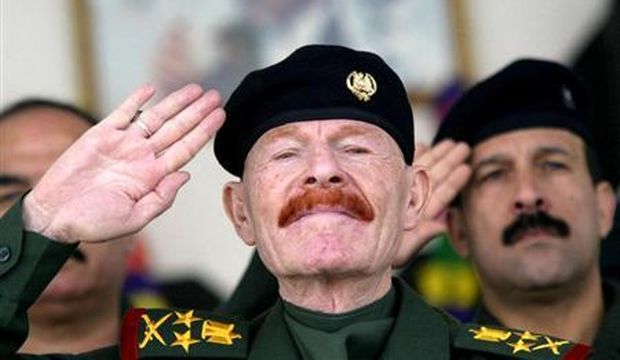Izzat Al-Douri was a figure of little consequence when he was the deputy of Iraq’s late President Saddam Hussein, and he has been of little significance since the Ba’ath Party collapsed and his president and other commanders were executed. What brought Douri back to the forefront is the recent audio recording in which we heard his voice for the first time in more than a decade. The recording has further strengthened our belief that the Ba’ath Party is history, despite allegations that Douri played a role in the recent fall of Mosul and Tikrit.
The Ba’ath Party died before Saddam did. It ended with Saddam’s struggle with its head Hassan Al-Bakr, and when Saddam seized the leadership of the party in the 1970s. The Ba’ath Party crumbled during the infamous incident when Saddam convened an assembly of the party’s leaders, accused a number of them of conspiring against him with the Syrian branch of the party and demanded they be taken out of the hall and executed. Saddam shed crocodile tears over them and had the video of the whole affair shown so everyone would get the message.
Afterwards, Iraq was governed by Saddam and his family. All Ba’athist leaders who surrounded him for around a quarter of a century were mere political decorations in the famous “republic of fear.”
As to why Douri resurfaced this week, the reason is unimportant because nobody paid much attention. Abu Bakr Al-Baghdadi, leader of the Islamic State of Iraq and Syria (ISIS), is more important than him. So why did Douri mention ISIS and praise it? This is strange because the organization considers Ba’athists such as him to be infidels. This is at the core of its ideology and teachings. An expert said Douri was forced to praise ISIS due to the terrorist organization’s domination over the Ba’athists and the abduction of its men from its ranks. He added that Douri wanted to neutralize the threat from ISIS to avoid its wrath.
Douri’s problem with ISIS is bigger than his problem with the regime of Iraqi Prime Minister Nuri Al-Maliki because ISIS opposes Sunni Sufism, including the Naqshbandi sect to which he belongs, and accuses its followers of apostasy.
If Douri is just a relic from the past, then what’s the role and significance of the Ba’athists, who surprised everyone in recent battles? There are Ba’athists, but there’s no Ba’ath Party. Ba’athists are merely an old association of those who feel marginalized by the regime and who have been pushed out of their jobs and all aspects of public life. Academics, military and security figures, local partisans and others who belonged to the Ba’ath Party have one mutual aim: to work against the current regime in the name of anything opposed to it. This is to be expected. However, they are not real Ba’athists, not in the way Douri tried to claim they were in his message.
Until 2003, most Iraqis—Sunnis, Shi’ites and others—were forced to join the party. Just like any other fascist movement, Saddam’s Ba’ath ruled with an iron fist, and Saddam himself was brutal and harsh. This is why he was defeated within weeks after he invaded Kuwait, despite his massive army. When the Americans invaded Iraq, the army did not confront them, but dissipated instead. The party is no longer of any value and Saddam no longer has followers who believe in him.
But Maliki, who as the saying goes, returned to Iraq riding an American tank, has not yet comprehended that since the US troops have withdrawn he has not been able to control all of Iraq through force, particularly the Arab Sunni and Kurdish areas. This is what happened last month when leaders of Maliki’s forces fled during the confrontation with ISIS fighters, tribes and former Ba’athist military leaders. Maliki himself is not any better than Saddam when it comes to centralizing power. What’s certain is that if he succeeds at remaining in power in Baghdad, Iraqis will revolt against him. He will then succeed in one thing: ensuring the collapse of the Iraqi state. His rivals are not the Ba’athists, but all Iraqis, including a large number of Shi’ites.
